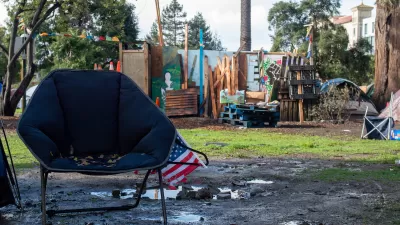Goals for low-income housing were lower in majority white cities and communities than they were in their more diverse neighbors.

A study from Berkeley's Haas Institute revealed a new wrinkle in the Bay Area's affordable housing crisis when it discovered that white communities were not planning for or setting goals for as much low-income housing as their neighboring cities.
The state of California sets housing goals by sending population estimates to regional agencies, including the Association of Bay Area Governments. "These agencies tell cities and counties how many homes are needed by income level, and local governments have to zone enough land to accommodate the new home building," Liam Dillon reports for Los Angeles Times. Cities with majority white population were not asked to build as much low income housing as more diverse cities, even when the cities had equivalent incomes.
This disparity is driven not only by the associations, but also by their constituents. "Moore, the study’s author, said the findings imply that cities in the Bay Area with larger white populations did not want such development," Dillon reports.
FULL STORY: White communities in the Bay Area have lower low-income housing goals, study finds

Maui's Vacation Rental Debate Turns Ugly
Verbal attacks, misinformation campaigns and fistfights plague a high-stakes debate to convert thousands of vacation rentals into long-term housing.

Planetizen Federal Action Tracker
A weekly monitor of how Trump’s orders and actions are impacting planners and planning in America.

In Urban Planning, AI Prompting Could be the New Design Thinking
Creativity has long been key to great urban design. What if we see AI as our new creative partner?

King County Supportive Housing Program Offers Hope for Unhoused Residents
The county is taking a ‘Housing First’ approach that prioritizes getting people into housing, then offering wraparound supportive services.

Researchers Use AI to Get Clearer Picture of US Housing
Analysts are using artificial intelligence to supercharge their research by allowing them to comb through data faster. Though these AI tools can be error prone, they save time and housing researchers are optimistic about the future.

Making Shared Micromobility More Inclusive
Cities and shared mobility system operators can do more to include people with disabilities in planning and operations, per a new report.
Urban Design for Planners 1: Software Tools
This six-course series explores essential urban design concepts using open source software and equips planners with the tools they need to participate fully in the urban design process.
Planning for Universal Design
Learn the tools for implementing Universal Design in planning regulations.
planning NEXT
Appalachian Highlands Housing Partners
Mpact (founded as Rail~Volution)
City of Camden Redevelopment Agency
City of Astoria
City of Portland
City of Laramie





























